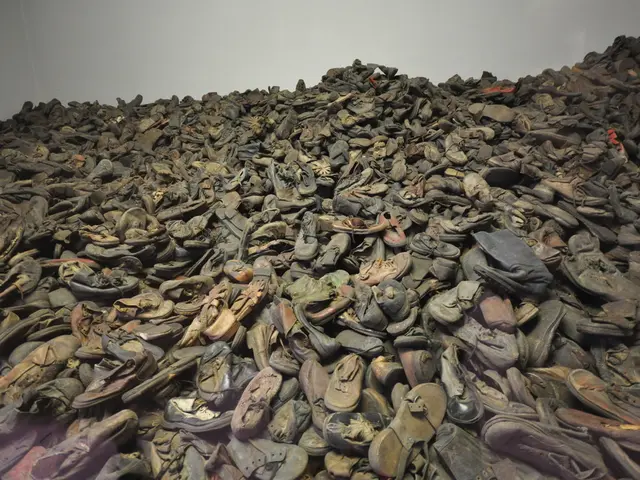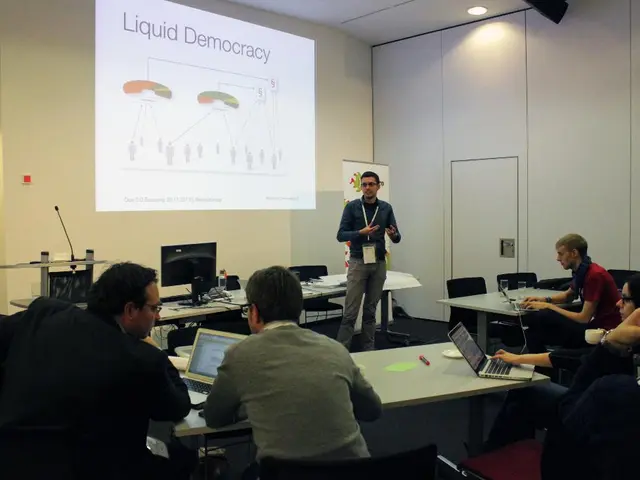prediction markets experiences a surge, raising concerns about the robustness of regulatory tools by the Commodity Futures Trading Commission (CFTC)
The Commodity Futures Trading Commission (CFTC) Whistleblower program, a crucial tool for promoting market integrity and government accountability, is currently facing financial challenges due to increasing costs associated with award payments and administrative expenses.
The program's financial strain is a result of several factors, including the growing number and size of whistleblower awards, the expanding scope and complexity of investigations, and the demands for inter-agency and international cooperation. As the program offers comparable incentives and confidentiality protections to other federal whistleblower programs, these challenges are not unique to the CFTC.
The CFTC Whistleblower program accounts for 40% of the disciplinary action by the CFTC's division of enforcement. The success of the program, reflected in the large settlements and enforcement actions, has led to an increase in award payments, putting a strain on the program's finances.
The program's future depends on Congressional appropriations, potential reforms to optimize fund usage, and continued emphasis on technology and cooperation to improve efficiency while maintaining strong incentives for reporting fraud and violations.
In a bid to reduce enforcement, interim chair Caroline Pham has emphasized self-reporting from companies, offering lenient handling of cases in which firms proactively disclose potential wrongdoing. However, this approach may not be enough to address the financial challenges faced by the program.
The CFTC is also likely to take on new responsibilities, overseeing sports prediction markets, another Trump administration priority. U.S. sports prediction market platforms such as Kalshi, Crypto.com, and Polymarket insist CFTC oversight is sufficient, despite the agency never dealing with the product type before this year.
However, the future of the CFTC Whistleblower program is uncertain. Once the balance of the whistleblower program surpasses $100 million in cash from sanctions, it can no longer add any funds. If the whistleblower program's fund is exhausted, the CFTC will not be able to support the operations of its whistleblower office and staff.
Brian Quintenz, a Kalshi board member and Trump's nominee to chair the CFTC, has had his nomination put on hold due to reports of him seeking non-public information about Kalshi's competitors. This development adds to the uncertainty surrounding the CFTC Whistleblower program.
Watchdog organizations have warned of dire potential consequences if the whistleblower program ends, stating it is about upholding the principles of accountability and transparency that are the foundation of our financial system. The continuing resolution bill in March provided short-term emergency funds for the whistleblower office, but this fix expires on Sept. 30. After this date, the whistleblower program's funding will come exclusively from civil financial penalties it levies.
In conclusion, the CFTC Whistleblower program, while vital to oversight, is currently experiencing financial pressure due to increased award payments and administrative costs driven by program success and complexity. The future of the program depends on Congressional appropriations, potential reforms to optimize fund usage, and continued emphasis on technology and cooperation to improve efficiency while maintaining strong incentives for reporting fraud and violations.
- The increasing award payments and expanding scope of investigations in the CFTC Whistleblower program require a thorough analysis of its financial management to ensure long-term sustainability.
- Efforts to optimize fund usage, such as inter-agency and international cooperation, technology implementation, and potential reforms, are essential when considering the future of investing in the program's success and maintaining its role in promoting finance and technology-related investigations.




